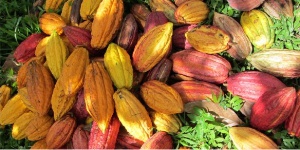Vice President Paa Kwesi Bekoe Amissah-Arthur says the cocoa sector is still a top priority in government’s medium- to long-term growth plans despite the fortunes of the crop facing difficult times.
Business Monitor International, which publishes the Ghana Agribusiness Report, has said it expects a flat production for the country’s cocoa sector due to “potential harvest delays on the back of dry weather”.
“Over the long-term, we forecast relatively pedestrian growth in cocoa production owing to reduced farm revenues and structural concerns in the sector, particularly labour,” it said.
However, Mr. Amissah-Arthur said government remains committed to implementing a broad number of policy measures to support the cocoa sub-sector. These measures, he added, will in the long-term ensure efficiency through streamlining of activities, interventions and programmes and contribute to growth of the sector.
The Vice-President, speaking at this year’s Ghana Cocoa Festival in Accra, said the measures will help consolidate gains the country has made in the sector. He said an increase in local cocoa consumption will serve as a further boost to the sector.
Ghana loses about 25 percent of its annual cocoa output to the black-pod disease, according to a research conducted by the Ghana Cocoa Board (Cocobod). The loss translates to about 212,500 metric tonnes of cocoa beans.
COCOBOD recently announced an agreement with the Netherlands Embassy and three other institutions to stem the huge revenue losses arising out of the black-pod menace.
The initiative, which has the Ghana Cocoa Growing Research Association Limited, Mars Incorporated and Mondelez International as partners, will make available over US$400million toward the production of new varieties of cocoa that can withstand the disease.
Cocoa earnings
The crop has been a top foreign exchange earner for the country, grossing some US$2.8billion in export earnings in 2012, making it the third-highest foreign exchange earner after oil and gold.
The industry is however battling challenges relating to pests and diseases, ageing trees and harsh climatic conditions which threaten annual production levels.
Output, which peaked at one million metric tonnes in the 2010/2011 season, declined to 850,000 metric tonnes in the 2011/2012 season. Cocobod last month announced that it has signed a US$1.2billion syndicated loan agreement with international banks for 2013/14 cocoa crop purchases, as against US$1.5billion in 2012/13.
The credit facility will enable Cocobod to raise funds to purchase 830,000 tonnes of cocoa from farmers for the season. Cocobod’s annual syndicated loan is a critical source of foreign exchange reserves for the Bank of Ghana, which sells cedis to the regulator in exchange for dollars.
Business News of Friday, 4 October 2013
Source: B&FT













